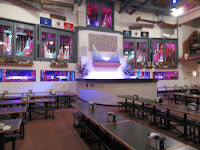We were surprised when our lunch stop turned into a
spectacular history lesson. Apparently in the late 1920’s, the Rudolph
Wurlitzer Company decided to expand beyond pipe organs for churches and
cathedrals, with short lived success.
 In 1910 in an attempt to open a new market, silent movie
theaters. Since movies had no sound and only subtitles in that era, theaters
would frequently hire entire orchestras to accompany the silent film. The
orchestra would play a score matching the action in the film, with a frenetic frenzy
when there were action scenes, somber tunes during romantic scenes, and the
like.
In 1910 in an attempt to open a new market, silent movie
theaters. Since movies had no sound and only subtitles in that era, theaters
would frequently hire entire orchestras to accompany the silent film. The
orchestra would play a score matching the action in the film, with a frenetic frenzy
when there were action scenes, somber tunes during romantic scenes, and the
like. Wurlitzer thought it could leverage its pipe organ
technologies to mimic the sounds of an entire orchestra. A theater, rather than
hiring an entire orchestra every day and night, could make an investment in the
Mighty Wurlitzer theater organ, and only hire one musician, with essentially
the same effect on movie goers. Unfortunately, it was not long before sound
technology eliminated the need for theater organs, but not before thousands had
been installed all over.
Wurlitzer thought it could leverage its pipe organ
technologies to mimic the sounds of an entire orchestra. A theater, rather than
hiring an entire orchestra every day and night, could make an investment in the
Mighty Wurlitzer theater organ, and only hire one musician, with essentially
the same effect on movie goers. Unfortunately, it was not long before sound
technology eliminated the need for theater organs, but not before thousands had
been installed all over. In 1927, a Mighty Wurlitzer was installed in the Denver
Theater in Colorado. By 1930 sound had made its way into film, and the organ
was no longer used. Dormant until 1975, an enthusiast bought this Mighty
Wurlitzer and move it to Mesa Arizona, and opened Organ Stop Pizza, attracting
groups to dine and take in concerts with this amazing instrument.
In 1927, a Mighty Wurlitzer was installed in the Denver
Theater in Colorado. By 1930 sound had made its way into film, and the organ
was no longer used. Dormant until 1975, an enthusiast bought this Mighty
Wurlitzer and move it to Mesa Arizona, and opened Organ Stop Pizza, attracting
groups to dine and take in concerts with this amazing instrument. We got an up close and personal look into this phenomenon.
Over the years, the owner has added pipes and instruments to where the organ
now boasts about 6,000 pipes – that makes it officially the largest such pipe
organ in the world! The master at the keyboard took us on a tour of all the instruments
he could play from his bench, including drums, symbols, bells, an accordion, bells,
etc. Seriously, he could make the sounds of woodwinds, brass or strings come
out of that Mighty Wurlitzer, making it truly sound like a complete orchestra.
We got an up close and personal look into this phenomenon.
Over the years, the owner has added pipes and instruments to where the organ
now boasts about 6,000 pipes – that makes it officially the largest such pipe
organ in the world! The master at the keyboard took us on a tour of all the instruments
he could play from his bench, including drums, symbols, bells, an accordion, bells,
etc. Seriously, he could make the sounds of woodwinds, brass or strings come
out of that Mighty Wurlitzer, making it truly sound like a complete orchestra.
To leave us with one last proof of its capabilities, he
decided to play a rousing rendition of Chuck Berry’s Johnny B Goode. Everything
from the famous guitar riffs to a simulation of the melodic vocal tones,
accompanied by the frantic drums, made for a very compelling finale.
Talk to you soon!
No comments:
Post a Comment